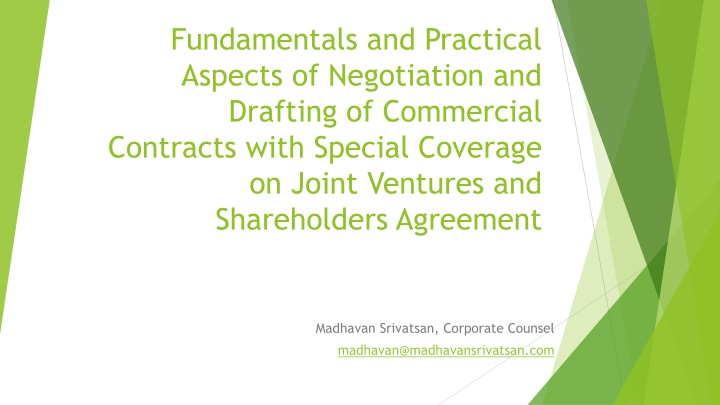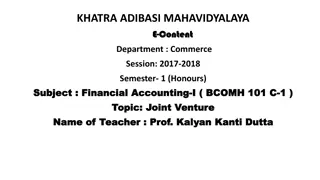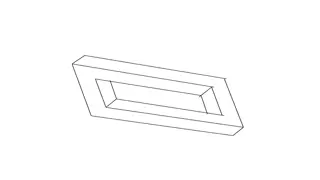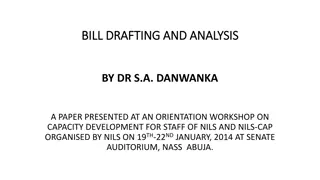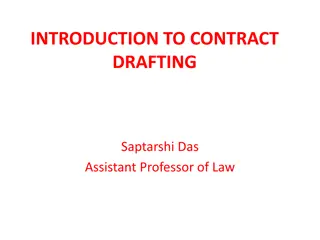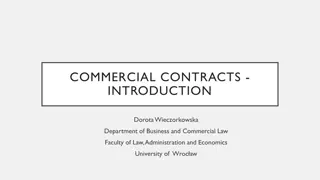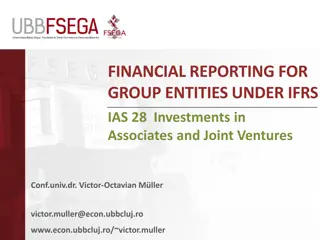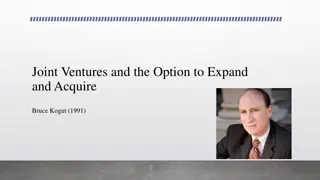Negotiation and Drafting Strategies for Joint Ventures & Commercial Contracts
Dive deep into the fundamentals and practical aspects of negotiating and drafting commercial contracts, with a focus on joint ventures and shareholders' agreements. Join Madhavan Srivatsan, a seasoned Corporate Counsel, to enhance your skills in crafting effective contractual agreements for successful business partnerships.
Download Presentation

Please find below an Image/Link to download the presentation.
The content on the website is provided AS IS for your information and personal use only. It may not be sold, licensed, or shared on other websites without obtaining consent from the author.If you encounter any issues during the download, it is possible that the publisher has removed the file from their server.
You are allowed to download the files provided on this website for personal or commercial use, subject to the condition that they are used lawfully. All files are the property of their respective owners.
The content on the website is provided AS IS for your information and personal use only. It may not be sold, licensed, or shared on other websites without obtaining consent from the author.
E N D
Presentation Transcript
Fundamentals and Practical Aspects of Negotiation and Drafting of Commercial Contracts with Special Coverage on Joint Ventures and Shareholders Agreement Madhavan Srivatsan, Corporate Counsel madhavan@madhavansrivatsan.com
Negotiation and Drafting of Commercials Contracts (including JV and SHA)
Contents: Pre-Negotiation: Preparation and Groundwork Commercials Letter of Intent/Non-Binding MoU/Term Sheet Binding MoU Negotiation: Give some and Take some Drafting of Commercial Contracts Distribution Contracts Employment Contracts
Contents: Joint Venture Agreement Shareholders Agreement
Pre-Negotiation: Preparation and Groundwork Commercials: Commercials are the foundation of all Commercial Contracts and the legal clause only supplement it; It is very important to understand the intent behind the Commercials and not just the factual information. The intent might be different than the factual data given by the Commercial team; Spend enough time with the business/commercial/sales team and grill them, if required, to take clarity; There is always a rushing deadline by Sales team Please take enough time to absorb the commercials and the repercussions behind it. You are the author of the contract, not the sales team .
Pre-Negotiation: Preparation and Groundwork Letter of Intent/Non-Binding MoU/Term Sheet Need to understand the difference between LoI, Non-Binding MoU and Term Sheet the non-binding intent versus binding intent ; Assess the requirement to have a LoI/MoU/Term Sheet before a contract; The provisions of these documents are important as provide a roadmap to the detailed contracts;
Pre-Negotiation: Preparation and Groundwork Letter of Intent/Non-Binding MoU/Term Sheet Contents of LoI/MoU/Term Sheet: Name and Title of Parties; Structure of Transaction (i.e. whether sale and purchase of goods, services, joint venture, technology sharing, intellectual property etc); Roles and Responsibilities of Parties (only in brief and until execution of detailed contract); Duration of the MoU and Timelines to complete the detailed contracts; Conditions required to be fulfilled for execution of contracts (such conditions failing which the transaction can be called off);
Pre-Negotiation: Preparation and Groundwork Letter of Intent/Non-Binding MoU/Term Sheet Contents of LoI/MoU/Term Sheet: Consideration/Payment; Exclusivity- This should be binding; Time period for execution of binding Contracts; Sharing of Information and Confidentiality (this is important clause because parties share lot of information in this interim period); Binding Nature (important to specifically mention which clauses are intended to be binding in nature); Jurisdiction and Dispute Resolution;
Pre-Negotiation: Preparation and Groundwork Binding MoU Need for a Binding MoU/Term Sheet: Not enough time to execute a detailed contract but important to bind the parties; Same contents as Non-Binding MoU discussed in previous slides; In addition, all those clauses of contract (as discussed in subsequent slides) which can be finalized; Fix timelines to finalize the clause/points which could not be finalized in this MoU
Negotiation This is pure Art. It can only be learnt with experience and cannot be taught. Start with the MoU/Term Sheet and first cover all the points mentioned therein; Give Some and Take Some; Don t open your cards initially; Don t show eagerness to commit unless there are clear instructions;
Negotiation Legal persons should not take a call on commercial points without due assistance/intervention from business/finance team; Be very clear in your mind as to what are the deal breaking points for yourself; Show respect and courtesy to the other side. Many deals gets broken or delayed on account of ego . If there is some point which is not important for you but is important for the other side, give it up after some time. Don t just stick to it for the sake of it. Please remember No one wants to know, how much knowledge you have. People want to close the deal and sign the contract.
Drafting of Commercial Contracts Need for a Contract Required for the purpose of Audit; Requirement to follow Arms Length principle; To record Related Party Transaction for good Corporate Governance; Requirement by Independent Directors on the board; Requirement by an Investor in the Company; Actual Need (as compared to an informal arrangement such as purchase orders, verbal arrangements etc.)
Drafting of a Commercial Contract General and Common Clauses Generic Clauses: Recitals Should give a very clear description of the nature of parties and the purpose of contract; Should ideally not contain the terms of the contract though Recitals may also be binding in nature; Definitions and Interpretations Definitions clarify the terms which are used in capitalized term and in the absence of a definition, one may draw a contrary or generic meaning such as Business , Business Days , Force Majeure , Material Adverse Effect Laws , Losses
Drafting of a Commercial Contract Do s and Don ts Do s Don ts Prepare a structure of the commercials; Don t depend on customary usage; Contract should follow the commercials and not the other way; Avoid lengthy sentences; Avoid using sub-headings beyond three levels unless necessary; Use definitions for generic terms such as Law , Event of Default , Loss etc.; Avoid too many cross references; Avoid too much of subjectivity such as as the parties may agree or best efforts The structure of the Contract should be, as far as possible, as per sequence of events such as introduction of parties, purpose, payment, roles, etc.
Drafting of a Commercial Contract Do s and Don ts Do s: Don ts: Avoid legal terms such as provided that or notwithstanding or subject to together in one sentence or clause; Use appropriate headings and sub headings; All the relevant clauses should be linked to each other with the prefix Subject to.. or Without prejudice to ; Avoid using the same heading for two different concepts to shorten the contract; Make sure there are no contrary provisions and if there is, use the words notwithstanding for one of the important clauses; Use annexure if a particular concept cannot be described in legal language such as calculations, technical inputs
Drafting of a Commercial Contract General and Common Clauses Generic Clauses: Interpretations They are as important as any other terms and conditions and they define the rules of the interpretation of a contract such as headings not to be treated as operative part , schedules to be part of the contract , references assigns , etc. to the Parties to include Scope of Work The Scope of Work should very clearly define the nature of services to be performed or the nature of goods to be supplied; If the Scope of work is detailed and lengthy, it is advisable to have it as part of the Annexure; It is important to mention as to whether the Scope of Work can be amended or not and if amended, what would be the variation of price.
Drafting of a Commercial Contract General and Common Clauses Generic Clauses: Consideration This being one of the important constituent of relationship, casual drafting should be avoided; In the event of dispute, the courts tend to follow the wordings in the contract rather than the intention of the parties; The Consideration may be based on the actual sales, may have in-built commission, based on profitability, fixed or variable commission. In the event of a breach of a contract, the consideration is an important constituent in assessing the loss of revenue or claims; Even though Tax structuring may not allow complete clarity, but an attempt should be made to give complete clarity. (Example- EPC Contracts);
Drafting of a Commercial Contract General and Common Clauses Generic Clauses: Consideration Subjectivity should be avoided. If the Consideration is based on Net Profits, Total Sales, Targets etc, the terms such as Net Profits , Total Sales , Targets should be very clearly defined in the Contract and not left to subjective interpretation; Inclusion or exclusion of Taxes should be very clearly specified; Any scope in variation of the Consideration should be very clearly mentioned along with a detailed mechanism as to how the variation would be effective and binding;
Drafting of a Commercial Contract General and Common Clauses Generic Clauses: Billing and Invoice This again is one of the important constituent of the Contract which should not be drafted loosely; On certain occasion, the party raising an invoice tend to follow customary practice and not the written contract by allowing certain delays. In such cases, it should be mentioned that, such waiver is optional and discretionary; In the event of a breakdown of relationship and service provider claiming a breach, any minor delay in payments in regular intervals becomes one of allegations in the notice; The billing cycle should be very clearly mentioned, whether it be weekly, monthly, quarterly or as and when certain events takes place;
Drafting of a Commercial Contract General and Common Clauses Generic Clauses: Billing and Invoice The number of Business Days within which payment is to be made should be mentioned clearly as well as the term Business Days should be defined clearly; Performance Review Based on the nature of the Contract, a review of performance is necessary whether it be a services contract, employment contract, collaboration contract, technology contract; A mere provision of Performance Review is not enough. There should be a detailed mechanism as to how the review would be conducted and based upon such review, if there is a downfall, the consequences (whether termination, adjustment in consideration, damages etc.) should be clearly mentioned.
Drafting of a Commercial Contract General and Common Clauses Generic Clauses: Roles and Responsibilities Roles and responsibilities along with rights of the party, should be clearly defined and should be as exhaustive as possible; Any lack of clarity in the roles and responsibilities leads to friction in the relationship between the parties; Minor obligations such as submitting regular report, providing additional services, providing back up infrastructure, inspection rights, intimating the other party of certain events at times assume a greater responsibility and thus whatever could be contemplated and agreed, should be put in writing and not left on good faith.
Drafting of a Commercial Contract General and Common Clauses Generic Clauses: Term of the Contract and Renewal The duration of the contract should be unambiguous and as far as possible, avoid concept like expiration at mutual consent ; If the intention is to have a long term relationship, then it is not advisable to have a unilateral termination without any reasons until a certain period, i.e. lock-in period to be provided; The mechanism of renewal should be clearly defined as to whether renewal is automatic unless terminated or whether renewal requires an affirmative action on part of the parties.
Drafting of a Commercial Contract General and Common Clauses Generic Clauses: Force Majeure Force Majeure is a French term which means greater power and it relieves the party from performing its obligation if an event occurs which is beyond the control of the Parties; It has certain inclusions such as floods, riots, political strikes etc. on account of which a party is excused from performing its part of the contract if any of such event occurs; However, it is very important to provide in the contract, that a party seeking recourse of Force Majeure was actually prevented from performing its part of the contract on account of such events;
Drafting of a Commercial Contract General and Common Clauses Generic Clauses: Force Majeure One of the important constituent of Force Majeure is beyond reasonable control of the party seeking to enforce Force Majeure . This provision should be caveated with obligation on the party to take all reasonable steps to prevent such situation; Once the agreed Force Majeure period has expired, there should be some cooling-off period during which the Parties should discuss and assess the situation; Depending on the nature of the Contract, it is important to make an assessment as to whether the Force Majeure event would make the entire contract incapable of being performed or only a part of the contract and accordingly provisions should be provided for the same;
Drafting of a Commercial Contract General and Common Clauses Representations and Warranties Representations and Warranties ( R&W ) is one of the most important part of the contract and has substantial legal consequences; R&W are the statement of fact about any particular and identified right, claim, asset or liability by the person deemed to be in control of such statement; The other party relies on the R&W given to enter into the contract; The statement of facts should be as of a particular date and not futuristic; Time limitation of the R&W with respect to a product should be very clearly mentioned;
Drafting of a Commercial Contract General and Common Clauses Representations and Warranties R&W should have certain exclusions such as normal wear and tear and any other technical exclusion which may ordinarily bring down the value of product in normal usage; Some of the R&W which are generic in nature and are quite broad such as infringement over third party s IP rights , compliance with law , etc. should be qualified with words to the best knowledge or subject to or except as disclosed ; If the R&W is given on usage/ merchantability of a particular product, such R&W should also provide conditions under which such R&W will not be applicable like mishandling , operation/ repair work done contrary to standard procedures etc.
Drafting of a Commercial Contract General and Common Clauses Representations and Warranties There should be limited qualification of R&W s; R&W should not be qualified with opportunity provided to the buyer to carry out inspection ; R&W should include warranty for the spare and ancillary parts; If any product is replaced during the Warranty period, a fresh warranty should commence on such new product; R&W with respect to purchase of goods should provide that such goods conform to the description in the invoice; There should be clear and clean title of ownership of the product/service intended to be purchased without any qualification particularly in cases of transfer of intellectual property or technology.
Drafting of a Commercial Contract General and Common Clauses Indemnities: Under the law of contract, Indemnity contract is one under which one party promises to save the other party from loss caused to him by the conduct of the promisor or any other person. One of the main difference between Indemnity and Damages is, Indemnity is usually claimed for loss arising out of action of a third party, whereas damages are claimed for loss arising out the breach of the contract by the parties to the contract; The main principle behind indemnity is to put the person back into the place he was before the loss occurred; All the members of Indemnified should be clearly mentioned such as officers , directors , agents etc.
Drafting of a Commercial Contract General and Common Clauses Indemnities: Whilst drafting Indemnity provisions, care should be taken to have a clear and concise definition of Losses . Exclusions such as consequential and indirect losses and inclusions such as costs, interests etc. should be mentioned; If there are two or more Indemnifiers, then it is very important to have clarity on joint and several obligations. The agreed position should be mentioned as to whether it is joint and several or severally and not jointly because in the absence of clarity, courts may interpret it either ways on other materials on record; Mechanism to claim indemnity should be provided in Principal to Principal contracts such as issuance of claims notice, responsibility to minimize the loss, right of Indemnifier to defend third party claims in court and restriction on the Indemnified from compromising or accepting the third party claim without contesting.
Drafting of a Commercial Contract General and Common Clauses Termination Termination of a contract can be broadly divided under two heads viz. (a) termination without reasons and (b) termination for reasons; Termination rights under either or both the headings mentioned above are totally based upon the negotiation strength of the parties; A less stronger party may not be able to have a termination right without reasons whereas the other party may the same right. In case of termination right without reasons, the other party should ensure that termination is done with sufficient notice period and all the benefits and payments needs to be settled before termination takes effect;
Drafting of a Commercial Contract General and Common Clauses Termination In an Employment Contract, the termination provision should also have a payment in lieu of notice clause on account of which the management may terminate the services with immediate effect by paying the salary for remaining notice period; In case of termination with reasons, it is very important that all the conditions on account of which a contract can be terminated should be mentioned in specific words and not mere cross reference; Again the nature of this right may depend upon the negotiation strength of the parties to the contract; It is very important to mention that the termination is an option at the hands of the party and is without prejudice to the other rights. In the absence of this clarity, a party intending to exit from the contract may wilfully breach the provisions and seek termination from other party.
Drafting of a Commercial Contract General and Common Clauses Termination Consequences post termination should be provided in the absence of which there is a greater chance of dispute between the parties; In case of termination on account of breach by other party, the contract should clearly mention that exact reasons should be provided in the termination notice.
Drafting of a Commercial Contract General and Common Clauses Important Boiler Plate Clauses Notice and Delivery: In the event of a dispute, the Party should send a written notice only to the address provided in the contract failing which there may be a strong possibility that such notice may not be considered. Further, the Parties should have an option to send the notice through the acceptable means of communication; Waiver: Each party should have a right to waive any breach of other party and at the same time, it should be mentioned that such waiver does not absolve the party from performing its part of the contract; Governing Law: In domestic contracts, the governing law has to be Indian. However, in International Contracts, it is of utmost importance to mention the governing law country , which means the laws of such country shall be applicable;
Drafting of a Commercial Contract General and Common Clauses Important Boiler Plate Clauses Dispute Resolution: It is this clause, which is interpreted strongly and in priority by the courts to adjudicate whether it has the relevant jurisdiction. If the Clause uses the word exclusive courts at , then it would be strongly interpreted to mean only that court has the jurisdiction. Similarly, if the clause contains arbitration provision, then again the civil court may not have the jurisdiction to adjudicate upon the dispute. Confidentiality: Confidentiality clauses restricts all the parties to the contract to divulge any details of the contract to any third party with exception towards in a legal proceedings, required under law etc.
Drafting of a Commercial Contract General and Common Clauses Important Boiler Plate Clauses Surviving Provision: It is very important to provide that certain key provisions such as Indemnity, Representations and Warranties, Notice Clause, Dispute Resolution will survive (i.e. would be valid) even after termination of contract. No Assignment: It is important to mention that neither party shall have a right to assign the contract to any third party without the express written consent of the other party. Annexures Annexures are considered to be integral part of the Contract and are provided for the purpose of clarity; Any particular clause such as detailed Representations and Warranties or any technical language which has a stand-alone effect should become part of the annexure to make the contract precise. Annexures should contain the same term as is used in the Contract and not any other term.
Drafting of a Commercial Contract Distribution Contracts Agreements between an Owner and Distributor wherein the Distributor undertakes the responsibility of distributing/selling the goods for and on behalf of the Owner Such Distributor Agreements can be for physical goods, services or e-platform such as consumer goods, tickets, etc.; In a typical Distribution Agreement, the title and the right to ownership remain with the Owner and do not pass in the hands of the Distributor;
Drafting of a Commercial Contract Distribution Contracts Performance Review/Sales Target- A Distributor Agreement is different from a Warehousing Agreement and accordingly terms should provide for sales target; Manufacturer s Warranty- The Distributor should have the right to pass on the Manufacturer s warranty on the product as-it-is to the consumers; Territory- The territory of the Distributor should be clearly defined to avoid any over-lapping with the territory of another distributor; Delivery and Shipment- The obligation to deliver the product till a certain place and mode of transport should be clearly indicated.
Drafting of a Commercial Contract Distribution Contracts Exclusivity v. Non- Exclusivity- Exclusivity or non-exclusivity on the Distributor to deal with competing products depends on the negotiation but the agreed position should be specified and not ignored. Advertising and Promotion- Obligation should be placed upon the distributor to advertise and promote the products in accordance with the directions of the manufacturer; Product Liability and Insurance- Product Liability should remain with the manufacturer whereas the responsibility of the Insurance is usually passed at the time of delivery to the Distributor.
Drafting of a Commercial Contract Employment Contracts A detailed employment agreement becomes important to retain a key managerial personnel as well as to ensure a system of checks and balances; Tenure of Employment and conditions for renewal; Non Compete- Unless an employee is paid non-compete fees after expiry of the agreement, a non-compete on the employee is difficult to enforce; Key Employee may have a trade mark in his/her name and thus Right of Company over any Intellectual Property developed by Employee during the Course of Employment should be specified; Rights and Responsibilities- In case of a key management personnel, it becomes extremely important to specify the exact nature of duties and rights in absence of which a dispute may arise with the Board Entitlements such as Sweat Equity Shares, ESOPs etc. should be clearly linked to the well defined targets;
Joint Venture Agreements Incorporated Joint Venture Unincorporated Joint Venture ABC Ltd KLM Ltd ABC Ltd KLM Ltd XYZ Ltd (JV Co.)
Joint Venture Agreements Incorporated Joint Venture ABC Ltd. And KLM Ltd are the shareholders in the JV Co. This structure is mainly used wherein two entities intend to keep their own business and JV Business separate; ABC Ltd KLM Ltd Also, they do derive the equity value from the JV Company; Also, this structure is used wherein there is a requirement for a special purpose vehicle (i.e. SPV); As the entire business is being managed in a separate legal entity , it is necessary to bind such entity; XYZ Ltd (JV Co.) The only binding thing is the shares held by ABC Ltd. And KLM Ltd. in the JV Co. Thus, there will be Shareholders Agreement (can also be called as Joint Venture Agreement)
Joint Venture Agreements There is no equity interest or ownership in any of the Parties Unincorporated Joint Venture This is mainly done for the purpose of a specific requirement in the business such as utilization of Trademark or Specified Services or Exploring certain Territory KLM Ltd. ABC Ltd. This is mainly for collaboration of certain synergies for the purpose of giving extra push and advantage to the existing business This is generally time bound and expires once the purpose of joint venture is achieved
Joint Venture Agreements Unincorporated Joint Venture Purpose of the Joint Venture/Collaboration is very important for this agreement as there is no common board of directors Key Concepts for Drafting JV Agreement Consideration ABC Ltd KLM Ltd Rights over the joint venture property such as market/customers , R&D Product , brand value etc. Roles and Responsibilities Expiry Period Termination Event of Default
Shareholders Agreement (SHA) Pattern (1) to (5) are shareholders in the Target Company with different equity interest 1 2 3 None of them on a stand alone basis can control the board of the Target Company. Thus, they require a detailed SHA (10%) (24%) (26%) There can be any combinations in order to control the Target Company which can give insecurity to the other shareholders ABC (Target Company) (1), (2) and (3) can join to form hands to control the Target Company (2) and (3) can join to form a single block majority but still cannot control the company (4) can join with any of other except (1) to get a right to block special resolutions 4 5 (6%) (34%) (2), (3) and (5) can join hands to completely take over the Target Company as they would collectively hold more than 75%
Shareholders Agreement (SHA)- Key Clauses Pattern Equity Holding Pattern: Record the equity interest of each party correctly and if they are holding convertible instruments , please record the same on a fully diluted basis Funding Support: Commitment by each or some of the Shareholders to provide funds in case of further requirements Business of Target Company: The actual business of the Target Company. Here the definition of Business becomes very important because it will be linked to non-compete Minority Protection Rights: In case of any further funding, all shareholders to be first given a priority. In absence of this clause, shareholder no. (1), (2) and (4) can be overlooked 1 2 3 (10%) (24%) (26%) ABC (Target Company) 4 5 (6%) (34%)
Shareholders Agreement (SHA)- Key Clauses Pattern Anti-Dilution Rights: In the event, there is further round of investment at a lower valuation than the valuation given to the existing shareholders, the existing shareholders would be given an adjustment in equity Quorum Rights in Board and Shareholder Meeting: Some of the shareholder(s) may want a contractual right from all the other shareholders that without their presence no meeting can be held. There can be various in-built combinations in this right . Veto Rights/Affirmative Rights: Some of the minority shareholders may ask for a contractual right to state that without their consent, no resolution can be passed. Generally, if such right is granted, the parties always prefer to agree on a list of such specific matters. 1 2 3 (10%) (24%) (26%) ABC (Target Company) 4 5 (6%) (34%)
Shareholders Agreement (SHA)- Key Clauses Pattern Share Transfer Restrictions Rights: 1 2 3 Tag Along Right: If (1) has this right over (2), then whenever (2) sells the shares, (1) can also sell his shares to same buyer at same price and seek an exit; (10%) (24%) (26%) ABC (Target Company) ROFR: (Right of First Refusal): If (1) has this right over (2), then whenever (2) decides to sell to any 3rd party, he has to give a right to (1) to buy these shares on the same terms on which they are being sold to the 3rd party; ROFO: (Right of First Offer): If (1) has this right over (2), then before taking any 3rd party offer to sell the shares, (2) has to first offer it to (1) and if (2) does not like the price, he can then sell it to 3rd party at a price higher than given by (2). 4 5 (6%) (34%)
Shareholders Agreement (SHA)- Key Clauses Pattern Share Transfer Restrictions Rights: Drag Along Right (This right is little draconian in nature and is also used in Event of Default cases)- If (1) has this right over (2), then whenever (1) decides to sell his shares to a 3rd party, (1) can force (2) to also sell his shares to such 3rd party on the same terms and conditions. Exit Rights: Exit rights means that a right has been provided to any one or more shareholders (typically a financial Investor who has invested for certain fixed returns) to exit from the Company with the assistance of other shareholders/promoters if such Investor is not able to exit on his own. This can be in the form of (a) IPO, (b) 3rd party sale, (c) buy back by existing shareholders (d) Sale of assets and liquidation, (d) drag along rights 1 2 3 (10%) (24%) (26%) ABC (Target Company) 4 5 (6%) (34%)
Shareholders Agreement (SHA)- Key Clauses Pattern Liquidation Preference: Some of the shareholders may want a contractual right that in the event of any liquidation of the company, once all the statutory dues are cleared, then they should first get the balance money in priority. There can be various combinations and such rights are in the nature of waterfall mechanism . 1 2 3 (10%) (24%) (26%) ABC (Target Company) Deadlock: There can be a situation wherein the Shareholders are not able to agree on a common resolution and either or all wants to part ways. In such case, either of the shareholder who want to part ways can either choose to buy shares of others or choose to sell his shares to others. 4 5 (6%) (34%) Standard Provisions such as (a) event of default, (b) termination etc.
Thank You Madhavan Srivatsan, Corporate Counsel madhavan@madhavansrivatsan.com +91 9810447406, Regal Building, 69, Connaught Place
